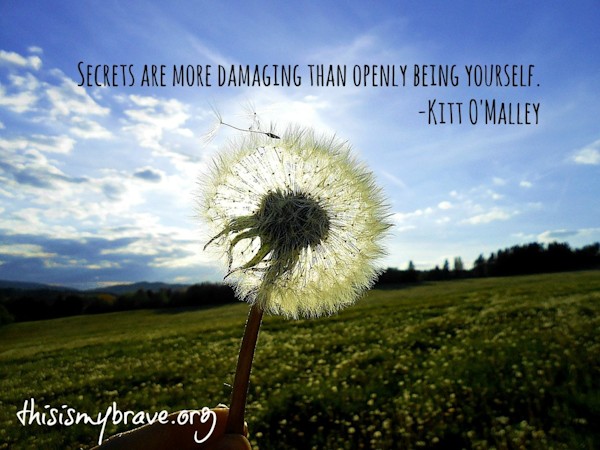Thank you, Jennifer Marshall for featuring my guest post on This is My Brave:
This Is My Brave Now – A Guest Post by Kitt O’Malley.
This is My Brave as I write these words. This is My Brave as I blog about living with bipolar disorder. This is My Brave as I use social media to advocate for mental health. This is My Brave as I train to volunteer educating others about my experience living with mental illness. This Brave enables me to stand up and speak out against mental health stigma and discrimination. Fellow mental health advocates have emboldened me. Together we are braver than we are apart. This Brave connects me to others. This Brave breaks down walls I constructed to protect myself. This Brave breaks down walls others construct to protect themselves from their fear of mental illness and of those living with mental illness.
For years I disguised depressive symptoms behind a mask of high achievement and perfectionism. As a college freshman, I grappled with suicidal thoughts, believing that the world would be better off without me. I did not tell my parents, for I did not want to disappoint them. I did not tell my college acquaintances. I kept my secret. Those friends I did tell made me promise to get help, which I did. The psychologist I saw practiced cognitive behavioral therapy which helped me to distance myself from my suicidal thoughts.
Finding my brave over the course of my life since then has been a gradual process. I spent my twenties in and out of therapy. By the time I was thirty years old, I had undergone years of psychotherapy, gotten a masters in psychology, became a licensed marriage and family therapist, worked at a battered women’s shelter, treated children and adolescents in day treatment, and adolescent girls in residential treatment, and counseled pregnant and parenting adolescents. As you can see, I was pretty deeply involved in the mental health field. Until one day I just could not, for the life of me, get out of bed. Not at all. This time, I called my parents and asked for their help. Crying over the phone, I told them that I just couldn’t do it anymore.
My parents flew up to help. All I had to do was ask. For the first time, I sought medical help for my depression. No longer did I try to tough it out using only psychotherapy, now I added psychiatric treatment and antidepressants to my arsenal. Unfortunately, tricyclic antidepressants triggered a week-long manic psychotic break, during which I did not sleep and thoughts raced through my mind faster than I could comprehend them. Since this break occurred in response to medication, I was not diagnosed bipolar at the time.
Recovery from this break involved moving back in with my parents. I took a temporary position with a commercial real estate firm that began a decade-long career in commercial real estate, a field not as emotionally demanding as psychology, but that took advantage of my still undiagnosed hypomanic symptoms.
My hypomanic symptoms were not yet included in the DSM diagnostic criteria for bipolar disorder. Instead, I was an overachiever diagnosed with chronic depression. I would tell doctors that I was at the very least cyclothymic, for I achieved more and produced more – way more – than others. I was a full-on workaholic. At work and in my personal life, I was honest and open about my diagnosis of depression. When undergoing dosage or medication changes, I informed my supervisors, for such changes often temporarily affected my behavior at the office.
At the age of thirty-nine, I began once again experiencing the euphoric sensation that God was calling me to do something. I recognized the symptom as mania and called the advice nurse, who recommended that I see a psychiatrist or go to the emergency room immediately. Upon receiving a diagnosis of bipolar disorder type II, I again openly shared my diagnosis with my employer.
In the workplace, with friends, and with acquaintances, I always found it more natural to be open and honest about my diagnosis. Having once been a mental health professional, I long had a passion for mental health. I knew that others could not see my illness. I knew that by sharing this fact I would challenge their assumptions.
Secrets are more damaging than openly being yourself. Once I hid behind perfectionism. As I became more accepting and forgiving of my own imperfection, of my humanity, as I showed myself the same compassion I once showed my clients, My Brave grew, grew to what it is today. This is My Brave now.


Leave a Reply